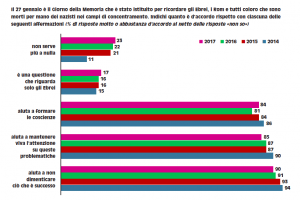NEWS Increasing Number of Italians Finds Holocaust Remembrance Day “Useless”
Holocaust Remembrance Day was established by the Italian Parliament in 2000. Since then, every year, the country has witnessed a growing number of events devoted to it, organized by national and local institutions, non-profit organizations and private citizens all over the country.
To measure and monitor the perception and the effects of Holocaust Remembrance Day and the issues at its core within the Italian society, SWG, a leading Italian research institute in cooperation with the newsroom of the Union of Italian Jewish Communities (UCEI), have been polling the public in the days prior to January 27. The poll has been carried out every year for the past four years. And although the results show that the majority of Italians looks at Holocaust Remembrance Day as a positive initiative, they also reveal some disturbing trends.
The most problematic data is that the percentage of people who think that Holocaust Remembrance Day is useless has more than doubled: in 2014 it was the opinion of only 11% of the respondents, in 2017 it was 23%. At the same time the percentage of people who believe that it concerns only Jews has grown, albeit modestly; from 15 to 17%, while those who say that honoring it is a duty are decreasing (from 45 to 37%).
At the same time, affirming that Holocaust Remembrance Day helps peoples’ awareness are 84% of the respondents and that it helps people’ memory of what happened during the Holocaust are 90% (both modestly decreasing from 86% and 94% in 2014).
“The Remembrance of the Shoah constitutes an inestimable value defending the democratic, open and civilized society we want to live in,” commented the editor in chief of the UCEI newsroom Guido Vitale, highlighting the importance of not underestimating the risks that the results show. “Remembrance is not a value that is important just to Italian Jews, it is a value that can survive and strengthen us only if it is shared by the entire Italian society.”

